W-S SKATEPARK PG. 7
CENTERING TRANS ART PG. 16


FAKE PREGNANCY CENTERS PG.

W-S SKATEPARK PG. 7
CENTERING TRANS ART PG. 16


FAKE PREGNANCY CENTERS PG.
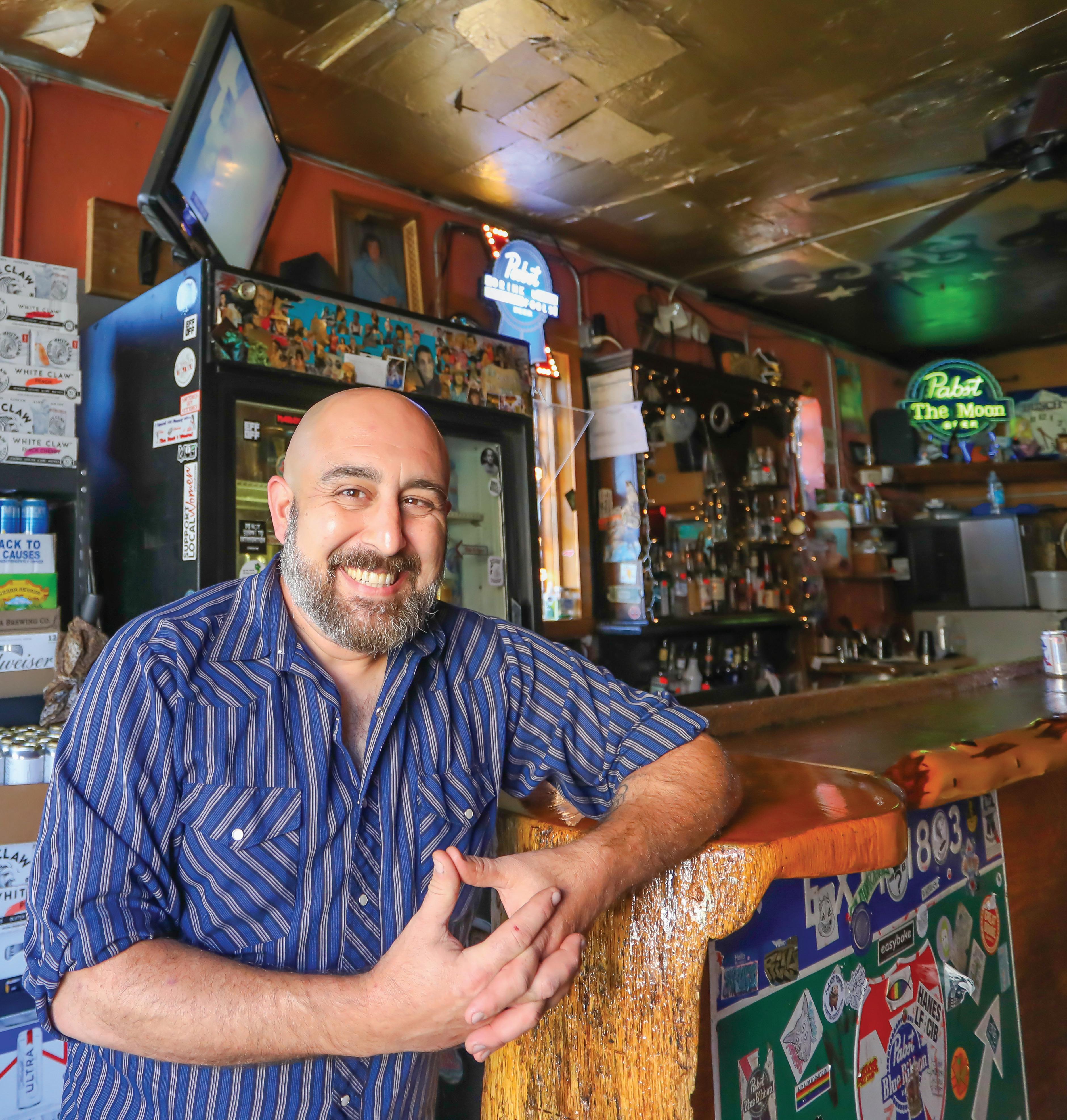 BY JAMES DOUGLAS | PG.
BY JAMES DOUGLAS | PG.
THURSDAY
Color, Cloth, and Chaos @ Greensboro Project Space (GSO) 12 p.m.
Local artist Greg Hausler is pleased to announce his first solo show Color, Cloth, and Chaos, an exhibition of paintings created by combining paint with clothing, fabric scraps and found objects. Stop by for a reception Sept. 9 at 6 p.m. Find more information at greensboroprojectspace.com
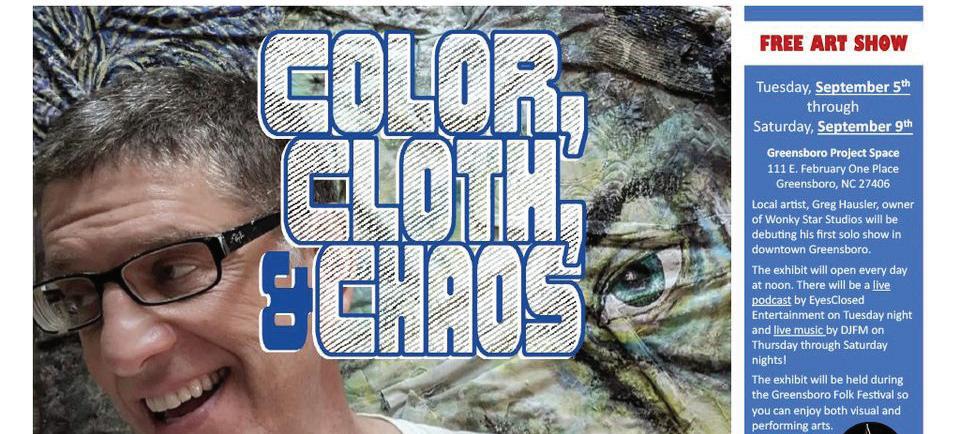
All the Love featuring Elena Armas @ Bookmarks (W-S) 6:30 p.m.
Join Bookmarks for an All the Love romance event with author Elena Armas as she discusses her new book The Long Game. Tickets include a glass of wine or non-alcoholic beverage and a book signing following the discussion. Purchase tickets at allthelove-armas. eventbrite.com
FRIDAY
Smith & Libby: Two Rings, Seven Months, One Bullet @ Reynolda (W-S)
9:30 a.m.
Smith & Libby: Two Rings, Seven Months, One Bullet will be on view until Dec. 31. The exhibition features archival objects, news articles and other items surrounding the mysterious death of Zachary Smith Reynolds, the youngest child of RJ and Katharine Smith Reynolds. Plan your visit at reynolda.org
p.m.
The NC Folk Festival is back for a weekend-long celebration of music, dance and diversity. Enjoy the sounds of more than 300 versatile musicians, participate in cultural workshops and shop for exclusive handmade crafts with local vendors. View a full schedule at ncfolkfestival.com
GreenHill Pop-Up Market @ NC Folk Festival (GSO) 5 p.m.
Speaking of the NC Folk Festival, GreenHill Center for NC Art is hosting its first pop-up market during the event. The mobile concept showcases visual art from emerging NC artists from teens to seniors. Find more information at greenhillnc.org/popup-market
Mean Girls Jr. Auditions @ Centennial Station (HP) 7 p.m.
High Point Community Theatre is seeking actors ages 12-17 for a production of Mean Girls Jr. Visit the event page on Facebook for audition forms and more information.
SATURDAY
5th Anniversary Celebration @ Garage Tavern (GSO) 12 p.m.
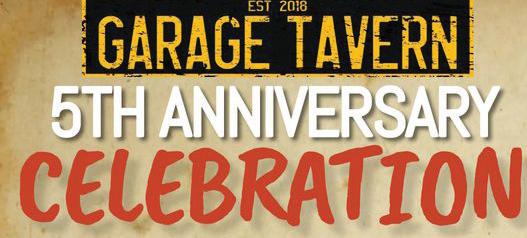
Garage Tavern is celebrating its 5th anniversary with its first block party featuring food and drink specials and live music from the Holiday Band, Cory Luetjen & the
Traveling Blues Band and Radio Revolver. Visit the event page on Facebook for more information..
4th Annual Black Luxe Expo @ High Point Theatre (HP) 2 p.m.
Shop for goods from your favorite Black-owned businesses during the Black Luxe Expo. There will also be live entertainment, food trucks, a kids zone and more to enjoy. More information at blackluxeco.com
Festival for the Homeless @ Gateway Commons Park (W-S) 2 p.m.
Living Is Finally Enjoyable (LIFE) W-S, Inc. presents the 8th annual festival for the homeless, providing services like haircuts, food, bags of useful items and more to those in need. Find more information at lifewsinc.org
Dogs in a Pile w/ Tand & the Wright Ave. @ COHAB.Space (HP) 6 p.m.
Head to COHAB.Space for a rocking concert with two exciting acts. Dogs in a Pile specializes in a psychedelic fusion of funk, jazz and rock and roll while the Wright Ave. creates grooves inspired by George Clinton & Parliament Funkadelic, Melvin Seals & the Jerry Garcia Band and others. Visit the event page on Facebook to purchase tickets.

TCBTix is the local ticketing platform created exclusively for Triad-area community events. It’s free, easy to use, and fully customizable with all-access ticketing features to meet your event’s unique needs.

TRIAD’S LOCAL EVENT TICKETING
POWERED BY TRIAD CITY BEAT
For more information, scan the QR code or email chris@triad-city-beat.com.


United Way of Forsyth County is hosting a free community event as part of its 100th anniversary celebration. According to United Way of Forsyth County President and CEO Dr. Antonia Monk Richburg, PhD, through family activities, food trucks, guest speakers and other activities, “Individuals and families will have an opportunity to learn about historical disparities exacerbated by Hwy. 52’s construction and how we are working to bridge the gap in 2023 and into the future.” Visit forsythunitedway. org for more information.
MONDAY
table artists. More information at stockandgrainhp.com
Casa Azul of Greensboro is pleased to announce its 2023 arts series: LATITUDES in Afro-Latinx Art on view until Oct. 28 at the African American Atelier Gallery in the Greensboro Cultural Center. The exhibition explores the African influence in Latin America and Latino art and culture. More information at casaazulgreensboro.org
SUNDAY
The Ladies Auxiliary @ Doodad Farm (GSO) 6:30 p.m.
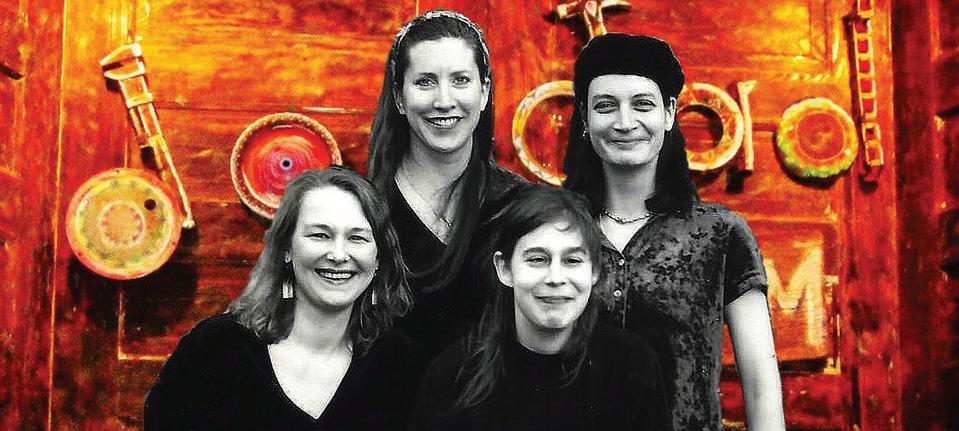
“The
p.m.
World of Beer invites you to test your knowledge on all nine seasons of “The Office” with trivia. Enjoy $7 burgers and brats and $2 off local drafts while you play. More info on the Facebook event page
THURSDAY
p.m.
Winston-Salem author Halle Hill will be at Scuppernong hosting a discussion of her debut short story collection Good Women, in which Hill explores the lives of 12 Black women across the Appalachian South. Find more information at scuppernongbooks.com
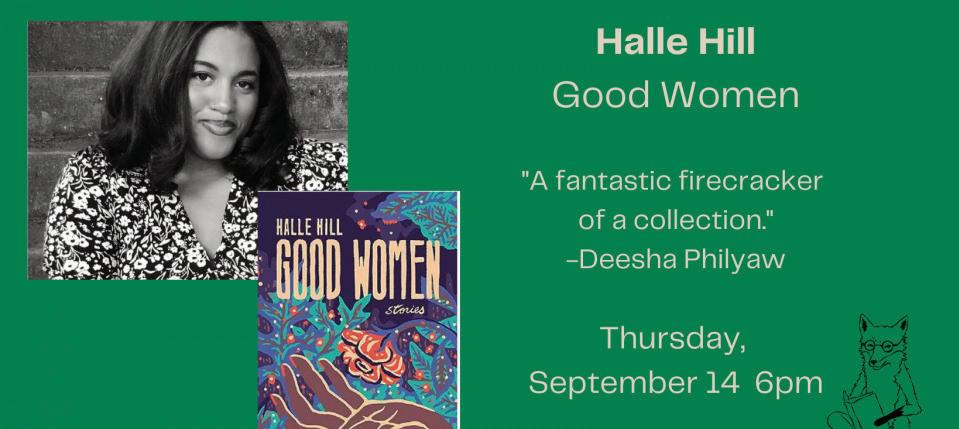
FRIDAY
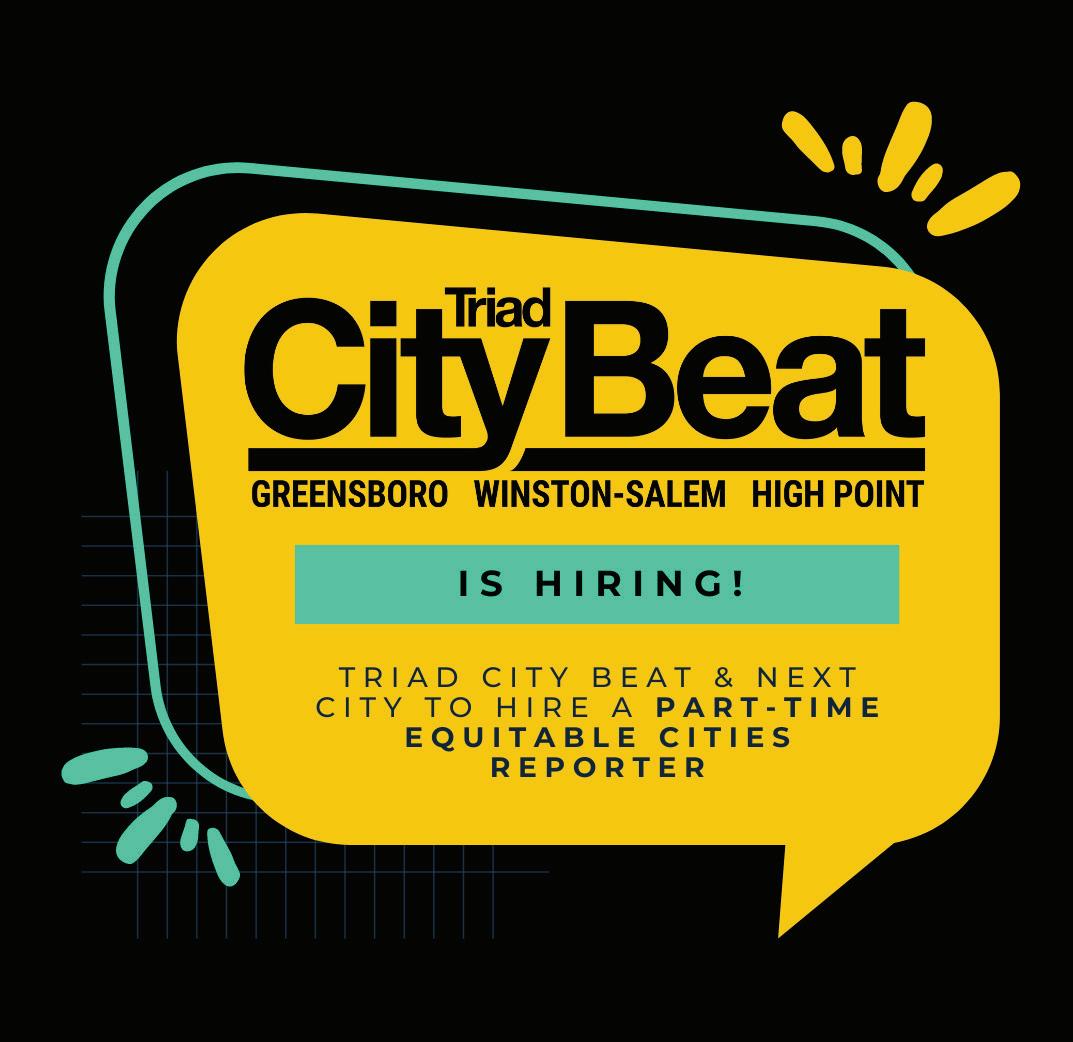

Ziggy’s at Stock + Grain Assembly presents an electrifying two-day experience provided by tribute bands during the High Point Music Festival. Pay homage to Michael Jackson, Rolling Stones, Tom Petty and other unforget-
Hang out with Morticia, Gomez and the rest of the creepy, kooky Addams family during this production by WSTA. The musical provides a new story for the family, where they invite Wednesday’s love interest Lucas and his family for dinner, and in true Addams family fashion, chaos erupts. Purchase tickets at theatrealliance.ws/ box_office

Enjoy the great outdoors with PEC staff as they lead you through monthly hikes on High Point trails and greenways. Contact PEC at 336.883.8531 to register. Visit the event page on Facebook for more information.
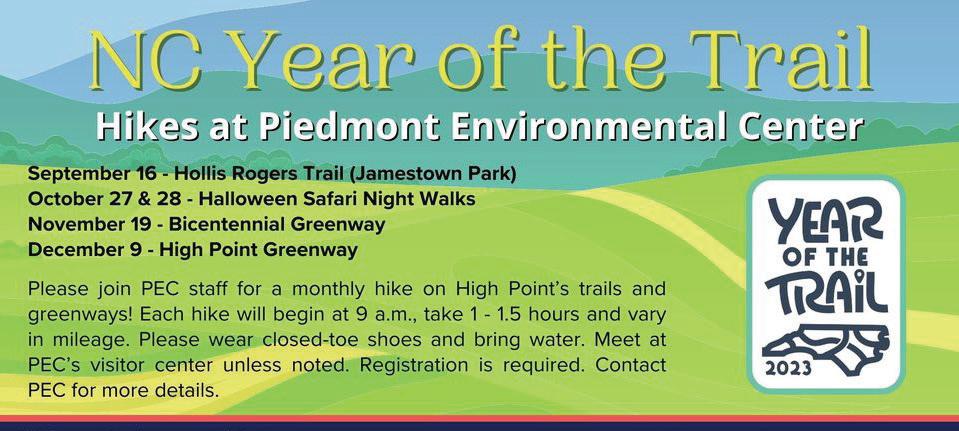
Day in the Park Arts Festival @ City Lake Park (Jamestown) 11 a.m.
Lots of festivals going on! High Point Arts Council celebrates the 49th anniversary of the city’s longest running arts festival with local artisans and their creations, live entertainment, food trucks and more good stuff. Visit the event page on Facebook for more information.
Ten Thousand Birds @ UNCSA (W-S) 3 p.m.
The School of Music at UNCSA presents Ten Thousand Birds, the score of which follows the cycle of a day. The immersive, outdoor performance is “inspired by the songs of birds that are native to or migrate through the region where it’s performed.” Tickets available at uncsa. edu/performances
Blues band The Ladies Auxiliary is hosting their own feature show of R&B, funk and classic rock tunes. While there’s no cost for admission, the hosts ask that attendees donate pay-what-you-can cash to be equally divided among the performers. Visit the event page on Facebook for more information.
Kimberly Varnadoe, Contemplating the Elements & James Gemma, Exploring the BOLD in Abstraction @ Artworks Gallery (W-S) 2 p.m.
Stop by Artworks for a reception and gallery talk hosted by Kimberly Varnadoe and James Gemma as they discuss their collections. In Contemplating the Elements, Varnadoe uses oil painting as meditation to “directly respond to a personal passage through emotionally conflicting times.” Exploring the Bold in Abstraction showcases James Gemma’s digitally-created art prints on archival papers and inks and acrylic paintings on wood panels. Head to artworks-gallery.org for more information.
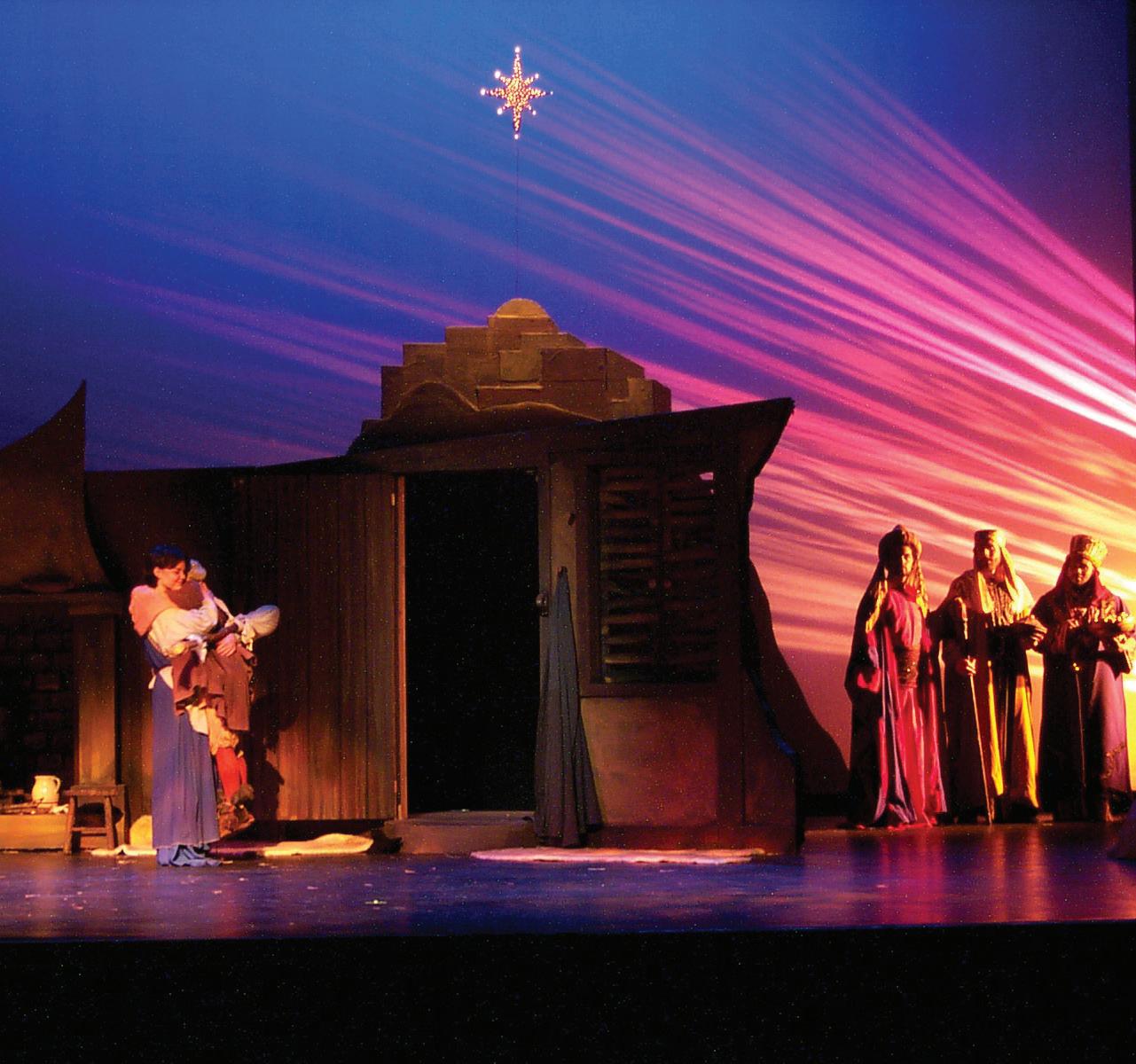
n Aug. 30, the reproductive justice news outlet Rewire published an investigative report titled, “Anti-Abortion Centers Spent Over $600M in One Year. That’s the Tip of the Iceberg.”
The piece delves into the money tracking of what are known as crisis pregnancy centers, or CPCs, that have popped up in droves as anti-abortion centers since abortion was first legalized in 1972. And as TCB has reported in the past, on average these fake pregnancy centers outnumber abortion clinics threeto-one. In the Triad alone, there are seven CPCs (if you include clinics in King and Lexington) and only two abortion clinics: one in Greensboro and two in WinstonSalem.
As TCB and various other outlets have reported, CPCs use deceptive tactics like free ultrasounds, which often aren’t administered by licensed health professionals, or the offering of free baby items like diapers, to dissuade people from seeking abortions. They sometimes have mobile “health” units that drive up next to abortion clinics and attempt to funnel patients through their doors.
OAs Rewire’s reporting points out, many of these centers get funding from both state and federal governments — $495 million in state funding since 2010. NC is one of the 13 states that has funneled taxpayer dollars to fund these centers.
More concerning is the black box of private funding from wealthy donors that seems to be keeping these centers going.
According to a 2020 report from the Charlotte Lozier Institute, an anti-abortion organization, “at least 90 percent of total funding for centers is raised through private donations.”
Financial records analyzed by Rewire indicate that nationwide, “CPCs could be receiving and spending more than $1 billion per year.” And most centers are receiving more funding than they ever have.

So, what about locally? Here’s a breakdown of revenue for CPCs in the last few years, according to their nonprofit financial reports, from most to lease revenue:
• The Pregnancy Network (Greensboro and Winston-Salem) - $1,956,700 (2022), $1,588,409 (2021), $975,790 (2020)
• Salem Pregnancy Support Inc - N/A (2022), $1,283,060 (2021), $452,877 (2020), $379,540 (2019)
BUSINESS
PUBLISHER/EXECUTIVE EDITOR
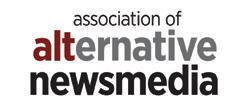

Brian Clarey brian@triad-city-beat.com
PUBLISHER EMERITUS
Allen Broach allen@triad-city-beat.com
OF COUNSEL
Jonathan Jones
EDITORIAL
MANAGING EDITOR
Sayaka Matsuoka sayaka@triad-city-beat.com
CITYBEAT REPORTER
Gale Melcher gale@triad-city-beat.com
KEY ACCOUNTS
SALES
Chris Rudd chris@triad-city-beat.com
AD MANAGER
Heather Schutz heather@triad-city-beat.com
TCBTIX

Nathaniel Thomas nathaniel@triad-city-beat.com
CONTRIBUTORS
Carolyn de Berry, John Cole, Owens Daniels, James Douglas, Michelle Everette, Luis H. Garay, Destiniee Jaram, Kaitlynn Havens, Jordan Howse, Matt Jones, Autumn Karen, Michaela Ratliff, Jen Sorensen, Todd Turner
WEBMASTER
Sam LeBlanc
ART DIRECTOR
ART
Aiden Siobhan aiden@triad-city-beat.com
COVER: James Douglas behind the counter inside Silver Moon Saloon, which he now owns.
And since the overturning of Roe v. Wade in June 2022, the centers have garnered even more attention as pregnant people have a much more difficult time accessing reproductive health care.

As of 2021, there were 83 crisis pregnancy centers in North Carolina compared to 15 abortion clinics, down from 26 in 2017 and 37 in 2014.
And it’s not just about accessibility; it’s also about money.
• New Life Family Outreach (formerly known as Pregnancy Care Center of High Point) - N/A (2022), $164,433 (2021), $243,805 (2020), $137,194 (2019)
• Birthright of Winston-Salem$105,047 (2022), $60,454 (2021), $62,367 (2020)
• Alpha Pregnancy Support Inc (Lexington) - $74,580 (2022), $86,056 (2021), $75,555 (2020)
• Hope Pregnancy Care Center Inc. (King) - $84,894 (2022), $19,155 (2021), $72,156 (2020)

Greensboro city officials hold quarterly meetings with members of the Guilford County Legislative Delegation. On Aug. 25, local legislators Rep. Pricey Harrison (D-Guilford) and Sens. Michael Garrrett (D-Guilford) and Gladys Robinson (D-Guilford) hopped on a Zoom call with Mayor Nancy Vaughan and Intergovernmental Relations Manager LaToya CaesarCrawford to discuss legislation progress. Hired in July 2022, Caesar-Crawford is the city’s first intergovernmental relations manager and acts as a liaison for federal and state lobbying efforts on behalf of the city.
City Manager Taiwo Jaiyeoba and City Attorney Chuck Watts were also present, as well as Council Members Hugh Holston, Sharon Hightower, Nancy Hoffmann, Tammi Thurm and Marikay Abuzuaiter.
According to legislators, the main obstacle restricting movement on Greensboro’s items of interest has been this year’s budget — currently languishing in legislative purgatory.
State budgets are typically submitted in July, but after months of stagnation, budget finalization is now expected the week of September 11 according to lawmakers.
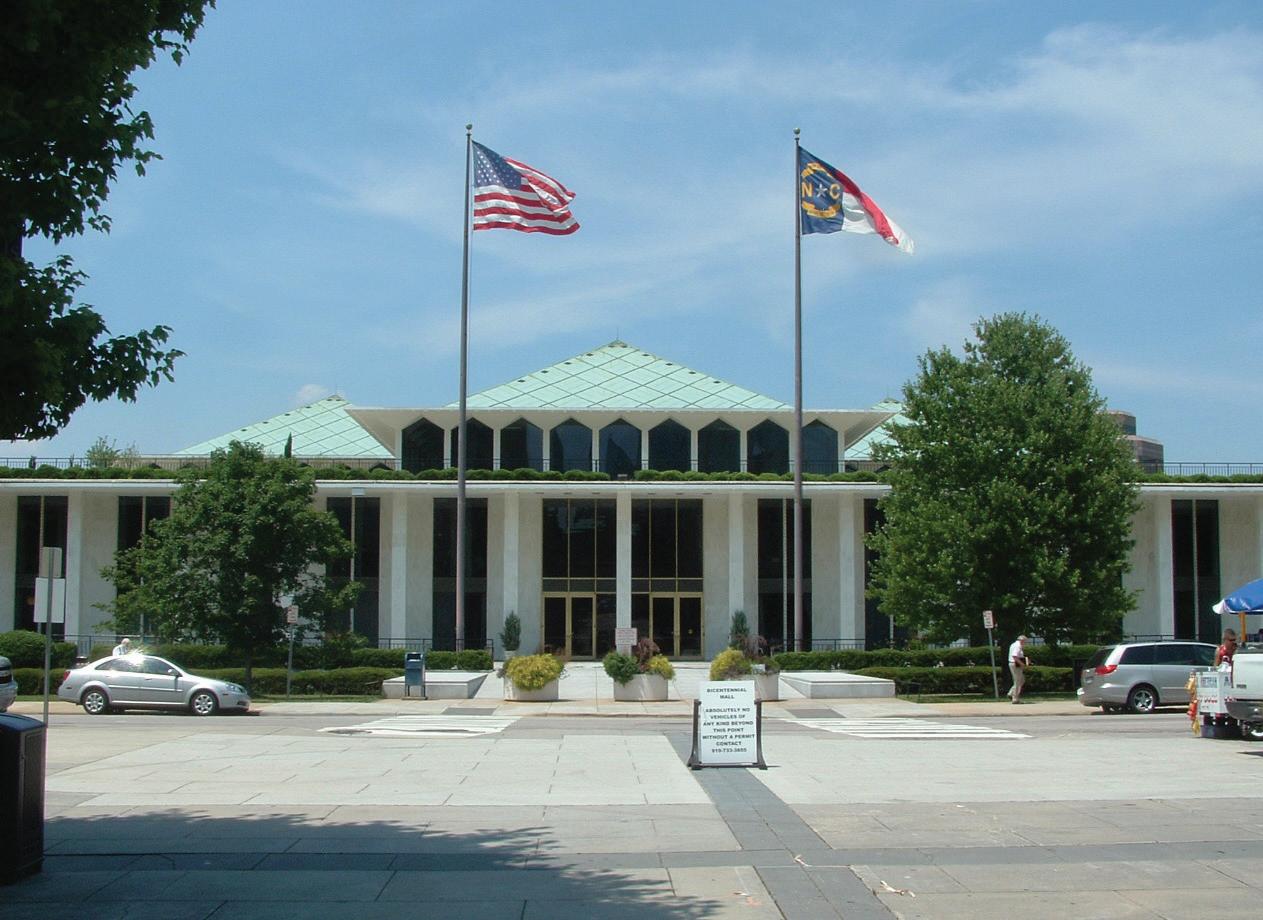
Here are some updates:
A civilian traffic investigators program (H140) is now general statute (Ch. SL 2023-52) after being signed into law by Governor Roy Cooper on June 23.
Cities in NC may now deploy civilian personnel to investigate traffic crashes. However, investigators do not have the authority to arrest or issue criminal process. They won’t have weapons and their uniforms will be significantly different in color and style from law enforcement officers. They also will only inspect crashes involving property damage.
Cities will establish the minimum standards for employment as an investigator who will have to attend a
training program designed by the North Carolina Justice Academy. After completing the training program, each investigator shall spend a minimum of four weeks of field training with a law enforcement officer who has experience conducting traffic crash investigations.
This bill was sponsored by reps John Faircloth (R-Guilford), Jon Hardister (R-Guilford), Donny Lambeth (R-Forsyth) and Stephen Ross (R-Alamance)
The remediation plan for Bingham Park Landfill (S223) hasn’t passed yet. The city has requested $32 million in state funding for cleanup and waste removal. Situated on top of a pre-regulatory landfill, the District 1 park is an integral part of three neighborhoods: Eastside Park, Willow Oaks, and Cottage Grove. There was an incinerator on site that burned household waste from Guilford County and the US Military. In tandem with the community, the city started planning efforts to redesign and improve the park in the late 2000s. These plans were stopped short in 2010 when the NC Department of Environmental Quality designated the site as an inactive hazardous waste/pre-regulatory landfill, requiring remediation prior to the completion of park improvements. The remediation option requested by the community has a total cost of approximately $39 million.
Sen. Robinson told the group that she’d heard from the governor’s office that $6 million has been appropriated for this project. They are still asking for additional funds. Robinson said she couldn’t say where it is in the budget, but that they’ve “made the request.”
“We’ll take $6 million and any more you can find,” District 1 representative Hightower responded. CaesarCrawford expanded on some of the city’s efforts to fund the project as well, noting that they have made some “very diligent efforts at the federal level” and have been working directly with the Environmental Protection Agency to explore environmental justice grants. “We just received communication… with regards to some other
potential environmental justice grants at the federal level that might be appropriate for the Bingham Park project,” Caesar-Crawford said.
There’s been little movement on a bill (H857) altering the “chronic violators of public nuisance or overgrown vegetation” ordinance. This would modify G.S. 160A200.1
As the law currently stands, a “chronic violator” is a person who owns property whereupon, in the previous calendar year, the city gave notice of violation at least three times under any provision of the public nuisance ordinance. The city has proposed a modification of the term of enforcement as a rolling 12-month period instead of a calendar year, “which would really allow for us to be much more effective in addressing repeated violators of the public nuisance ordinance,” according to Caesar-Crawford.
The bill hasn’t progressed in the House since April. Juan Pleitez, policy advisor and research assistant for Hardister’s office, blamed the budget for the standstill. “Obviously the budget proceedings have taken priority over that, I think after the budget process moves forward and comes to fruition we’ll be able to take up some more policy-oriented bills. So we haven’t seen a lot of movement on that from our office…. I know it’s been on our radar, I know it’s something that we worked in conjunction with y’all in very early meetings at the beginning of the year.”
“That’s critically important,” Hightower noted to Pleitez, adding that she’d love to see movement on that bill because “that’s gonna help us with some enforcement in some communities” that “sorely need it.”
The contentious bill concerning a civil service review board for Greensboro and Winston-Salem city workers came to pass on Aug. 16, but not before going through some drastic, last-minute changes. Now, instead of including all city workers, the board and its privileges will only apply to fire and police employees.
traffic investigators to sports betting, here’s what GSO city leaders and state lawmakers discussed during Aug. 25 meeting
The law paves a new way for fire and police employees in Greensboro and Winston-Salem to contest decisions such as firing or demotion via a civil service board. Workers will be able to request a hearing and go before the five-member board to plead their case.
The city is coming to terms with the law. “We are now, as a city, coming together to determine over the next several months what we need to do next in terms of next steps,” Caesar-Crawford stated.
“I was disappointed to see our general service workers excluded from that and maybe there’s an opportunity for inclusion at a later date,” Vaughan said.
“I think at this point those workers feel duped if I can say that word, that they were used to get that civil service board but they were blatantly omitted. And so after having talked to some of them… they question the process,” Hightower said, adding, “There was nobody to advocate for them.”
A new law now bans street takeovers across the state (S91).
The law banning these reckless driving stunts goes into effect on Dec. 1. Street takeovers often involve blocking off intersections and speeding or showing off stunts like drifting, donuts, etc.
Any person who knowingly violates the law is guilty of a Class A1 misdemeanor and shall pay a minimum fine of $1,000. A subsequent violation within a two-year period is a Class H felony, including a minimum fine of $1,000 that is equal to twice the value of the vehicle involved.
It will also be illegal to facilitate a street takeover or coordinate one through social media.
Law enforcement may seize the vehicles of those who have violated the law.
Any vehicle seized will be delivered to the county sheriff .
A bill regarding the disposal of unclaimed firearms, H284, would modify G.S. 15-11.2
The legislation hasn’t moved since March.
What the city has proposed would allow for the head or chief of law enforcement to order the disposition of the firearms collected by their city per their discretion.
The city is currently collecting between 1,200-1,500 firearms annually.
Sports betting is coming to NC (H347). The bill authorizes and regulates betting on horse racing and professional, college and amateur sports in NC.
Ratified on June 8, the law will go into effect in January 2024.

“That is really good news,” said Vaughan. “We have the perfect location for it, and it would be a big revenue stream that we don’t currently have.”
Remember those budget delays? This is a big deal for those on Medicaid, the health insurance program supporting 2.3 million low-income North Carolinians. When state lawmakers voted to expand Medicaid this year, they tied
it to passing a budget. Now, dragging budget talks spell delay for hundreds of thousands of North Carolinians. On August 28, the state’s Secretary of Health and Human Services Kody Kinsley said that the delay “tragically results in hundreds of thousands of people not being able to access care when they may need it most.” Nearly half of the people eligible for expansion would be automatically enrolled in full coverage on day one, Kinsley said.
Kinsley told NC Newsline that if the budget slides into September or later, “we’re looking more like Dec. 1, or perhaps well into 2024” for a start date. “My heart hurts because of the tragic loss of coverage that thousands of people are experiencing each month that could stay on — 9,000 people roughly a month could stay on if expansion was in place,” Kinsley told Newsline
“I think it is a shame that the current delays are causing us to lose hundreds of millions of dollars a month that could be coming into our healthcare system in this state,” Kinsley said, “at no cost to the state taxpayer.”
Sen. Robinson told the group on Aug. 25: “We had hoped that we would really be able to have a separate bill — a pullout from the budget — but that didn’t happen. So we’re just at the mercy of the budget-folk — Berger and more — in terms of getting Medicaid expansion.”
For Sturgill Horn and other skateboarders in Winston-Salem, the sport is as natural as breathing — and so is fighting for it. Winston-Salem only has one skatepark, located at the Fairgrounds on Deacon Boulevard in the North Ward.
“When they first built the skatepark, he had just been born,” Horn said, gesturing to his 8-year-old son Jupiter. Horn has been riding a skateboard for 30 years since picking one up when he, too, was 8 years old.
As years went by, the park desperately needed some upgrades. In 2022, the pump track — an undulating 325-foot-long obstacle — began to deteriorate as it took on water, putting skateboarders at risk for injury. When the pump track was removed, Horn said it was like a breath of fresh air.
“You could see a possibility,” he said.
Horn said that the pump track “looked neat to people that didn’t skate” and that it’s good for kids, but for safety reasons it needs to be in a field or on rubber mulch. It was placed on a concrete surface. Some obstacles were also too close together, Horn said — within five feet of each other.
“It was just ridiculous,” he said, adding that he didn’t feel comfortable letting Jupiter skate there because it was too dangerous.
“Now it’s got a good flow to it,” Horn said.
In February, city council approved a nearly $124,000 contract for new equipment purchases; installation wrapped up at the end of August.
Now the park has a few new, shiny pieces of equipment where skateboard enthusiasts can show off their skills, such as a china bank — a steep slab with ledges. The decaying pump track is long gone, only a tan line snaking across the concrete remains.
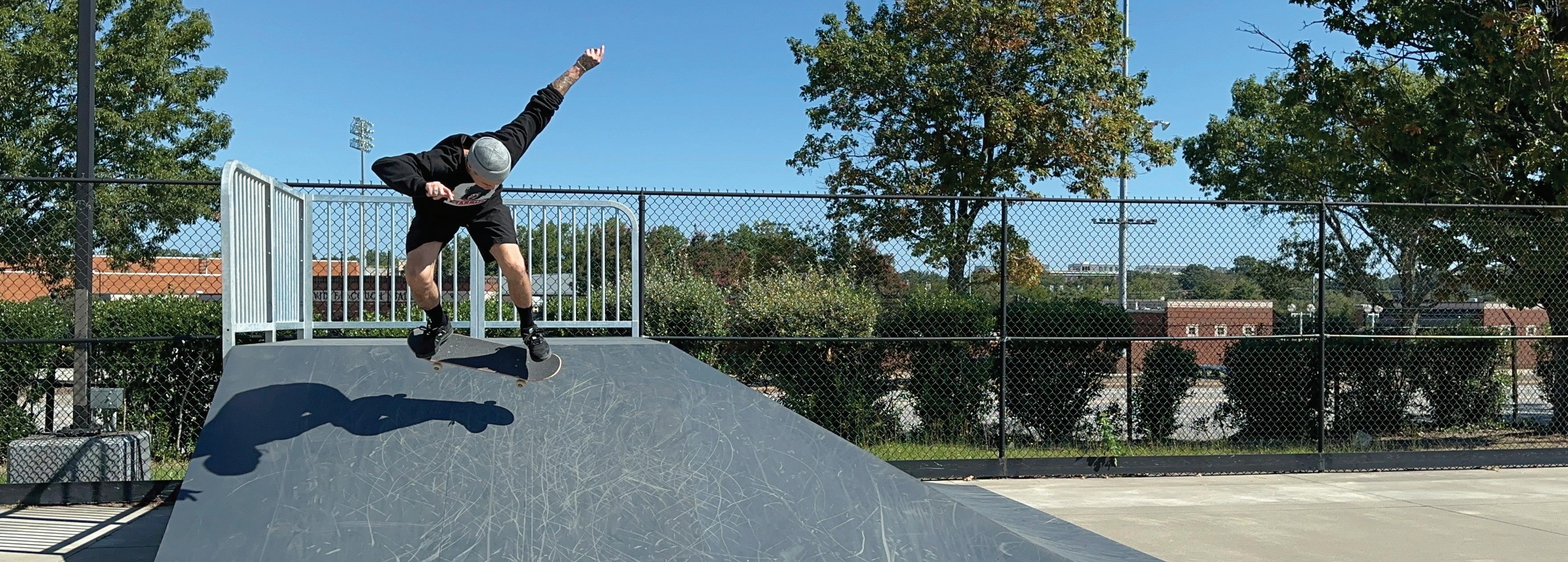
Not everyone was happy with the park’s design when it first opened. Horn said that many of the “guys that really looked forward to skating this park” when it first opened have now quit.
“Those are the guys that I grew up with, the people that pay the taxes to get this place. And they were so disappointed,” adding that many of them said that they’d just work out at the gym instead.
“I gave up on this place,” Horn said. “I would just have to find other ways to soothe, and a lot of those are super toxic. And that’s what a lot of the guys and gals and kids are going through because this place sucks.” It was depressing, too, Horn said, because there are no other options in town.
But then Horn met his partner Elizabeth, who encouraged him to get back into skating. Horn skated in front of the bars downtown, he said, noting that bars were where a lot of the guys he used to skate with ended up after skateboarding.
“That’s pretty much where we go, and that’s not healthy,” Horn said. Gesturing to park, he continued, “This needs to be the bar, this is where we’re trying to spend the majority of our time as skateboarders.”
So Horn started skating at the Fairgrounds again around this time last year, but he wanted it to change. People were getting injured from the pump track, Horn said, and so the idea sprang up to simply get rid of it. Horn said that his logic was that if there’s “some rusty piece of equipment that’s on a field, it’s dangerous so as patrons we can just remove it.”
“I wasn’t trying to cause a problem, but it caused some issues the way that I was doing it,” Horn said, adding “I got a call from the police department and they were like,
Sturgill Horn skates at the recently renovated skate park in Winston-Salem. PHOTO BY GALE MELCHER‘Hey, we need you to do a hard post and tell everybody not to go to the skatepark and take apart the pump track and remove it.’”
Community engagement in city government eventually brought changes to the park. Horn received a message from the city’s former Senior Community Educator Braxton Langston-Chapman, who now works for Forsyth County. He reached out to Horn to help him get in touch with people at the city so Horn could make some actual change — giving Horn advice about who to contact, what their positions were and what Horn needed to do to get something accomplished.
“He was very meticulous,” Horn said.
In an interview, Langston-Chapman told Triad City Beat that he thought Horn’s frustration was a “good time to educate citizens on the proper way to make their voice heard.”
“All I did was point him in the right direction of who to speak with and who to call,” he said.
Horn eventually spoke to the right people in the city and did a walkthrough of the skatepark with them, he said. He said that he showed them the dangers with the way it was previously set up and gave them ideas about what kind of equipment the park needed.
“Call your elected officials. Come to council meetings. Talk during the public comment period. Figure out who is in charge of what,” Langston-Chapman said, adding, “Sturgill figured out who was in charge of recreation and parks, he figured out who was in charge of the Fairgrounds and got what he needed done.”
William Royston, the head of the city’s parks and recreation department, told TCB that there was community engagement when it was initially designed years ago, but that it was “just with a different group.” Royston said that before the city moved forward with plans for new equipment purchases this time around, they got input from the community, which he thinks “is important because at the end of the day it’s the citizens’ skatepark.” Royston said that working with Horn and the community took place “over several months,” where they met with them and listened to their input.
Despite a delay in getting the equipment, Horn said that the city moved quickly and shut the doors for a week or two while installations took place.
“Now we have this,” he said, “and it’s amazing.”
At the end of September, the skatepark will close temporarily due to the Carolina Classic Fair which is hosted at the fairgrounds.
That takes the culture away from so many who use skateboarding as a pastime or creative outlet,” Horn says.
“They’ve taken it away every single year for nine years,” Horn said. When the skatepark closes for the fair, Horn thinks that there will be an “influx of people getting tickets downtown because they’re still handing out skateboard tickets.”
The city’s code states that it’s against the law to “coast on a sled, coaster express wagon or toy wagon or move or skate on any roller skates, skateboard or other similar device upon any public street, right-of-way, sidewalk, park or other public property located in the central business district of the city.” Violators are slapped with a Class 3 misdemeanor and a maximum fine of $500.
Plus, with increased visibility and skatebard-centric events like the WinstonSalem Skateboard Open which took place downtown in mid-August, Horn feels like skateboarding needs to expand beyond just the Fairgrounds skatepark.
Right now, the park is north of the city’s downtown center, and not accessible to people in other parts of town, Horn said.
“They ain’t got bus money — they’ve got a skateboard,” he said.
“A skatepark needs to be accessible to downtown,” Elizabeth said.
Horn ultimately sees the need for another park.
“This is Northside, this is almost out of town,” Horn said, adding that there’s a huge need for an in-town skatepark. “Like Mooresville, or Lexington, or Raleigh or Mount Airy or Greensboro. Lexington is a dying city, you can’t even get good barbecue in Lexington anymore and their skatepark is five of these!”
Winston-Salem’s is also surrounded by a wire cage, something Horn points out is different from parks in other cities.
“Greensboro, Mooresville, it’s all wide open, you can picnic,” he said. “They got us backed up here in the industrial area at the damn Fairgrounds.
“Winston-Salem is the city of arts and innovation and is ready for the innovation for

skateboarding,” he continued. “It’s an Olympic sport.” There’s only one park in the city “for now,” Langston-Chapman said. But even if there were plans for another, Royston isn’t sure if it would be downtown.
“That really depends. We’re always looking to expand recreation opportunities,” Royston said. “We do hope to build more facilities, I just don’t know if downtown is going to be the place to do that.”
Because of the lack of available places to skate, Horn has been part of a guerilla equipment installation located at the old BB&T Financial Center building downtown, fixing 30 feet of angle iron to a surface with a caulk gun. They skate, and then they make sure all their trash is picked up before they leave. As to whether he’s worried it will be removed, Horn said, “I want them to contact me, not try to catch me. Where can we put this?”
The renegade said that it’s a great outlet for kids downtown to get some tricks in, and that it gives the area’s unhoused people an opportunity to skate as well.
“Skating’s not an afterthought to some people,” Elizabeth said, adding, “It might be to a lot of people. But this is what they need to not hate their lives.”
Gliding around the park, wiry Horn performs tricks high and low with his board.
Horn said he loves three things — Jupiter, Elizabeth and skateboarding.
“I love him, and I love her,” Horn said. “Without [skateboarding] I get weak. I get super weak.” Horn said it’s the same way for a lot of people. Skateboarding is their “crutch,” he said, adding, “This is their emotional support group.”
Elizabeth agrees. “This is their preferred hobby that is an outlet to relieve stress, to get exercise. It’s like any other outlet.”
Jupiter rides a skateboard just like his dad. “I try not to soccer-mom him too hard,” Horn said. “He likes it for now. So as long as he likes it, I’m gonna keep fighting for the kids his age and older.”
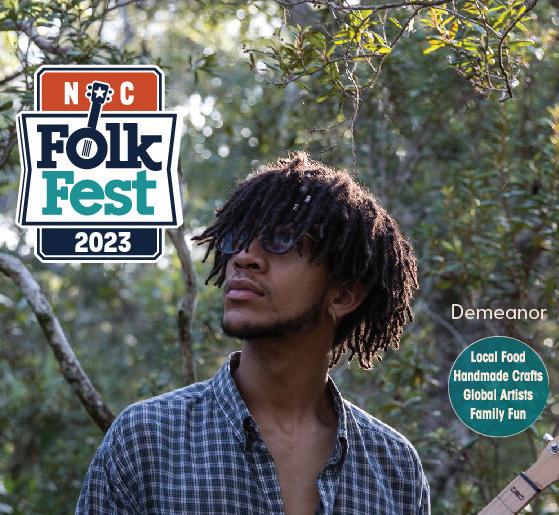
The North Carolina Folk Festival returns to downtown Greensboro Sept. 8-10 for its fifth year with great music, good food, attractive crafts and more for the whole family to enjoy. The three-day, free-admission, multi-stage outdoor festival features a lineup of more than 300 artists from various genres, offering a range of performances that highlight Greensboro’s dedication to diversity and inclusivity in the arts scene.
“Greensboro is a community that values the creative cultural expressions of global, American roots, and North Carolina artists,” says Amy Grossmann, President & CEO of the NC Folk Festival. “The broad range of musical styles we highlight in our program each year is a reflection of those values - presenting familiar sounds while simultaneously welcoming the new and unfamiliar.”
Bask in the Venezuelan-Appalachian sounds of duo Larry & Joe, dance along with the Green Grass Cloggers and Little Stony Nighthawks or praise and worship with the Dedicated Men of Zion.
This year, the folk fest is excited to announce its partnership with JM International (JMI) to bring the international folk music exchange program Ethno USA to the festival, hosting collaborative and educational opportunities for musicians to share cultural experiences through music.
“Core values of welcoming and supporting people from diverse backgrounds are imbued into the spirit of the Greensboro community and into our presentation of the NC Folk Fest each year,” says Grossmann. “This partnership with Ethno USA is a natural and fitting extension of our shared values to promote cultural understanding through the arts, and we are thrilled to build on that community spirit.”
Ethno will convene nearly 40 musicians from around the world for a week-long residency in Greensboro where each participant will teach a folk or traditional song from their home country during workshops and jam sessions. The residency features three public performances of original and new songs created during the residency, and two of these performances will be featured on stage during the festival. People will come together to view the performances, much like the artists coming together to create them.
“Ethno has a successful track record of bringing people together to cooperate, collaborate and learn from each other. For so many participants, Ethno is a life-changing program,” says Suchet Malhotra, Program Director of Ethno. “Musicians learn how to coexist in harmony, solve and dissolve their differences, and co-create something much larger than themselves, something that they can be proud of. The learnings and takeaways reverberate for years.”

In addition to concerts, the festival features facilitated workshops with some of the festival’s performers, dance socials and jam sessions. Treat yourself and others with gifts from marketplace vendors including handjarred honey from NC Bee Exchange, handcrafted natural body products from J.L Essentials or seasonings and sauces from Black Dog Gourmet Sauce Company.
On Sunday, Sep. 10, start your morning by running in the first-ever 5K to support the NC Folk Festival before enjoying the final day’s performances, food trucks and family activities.
Learn more at ncfolkfestival.com
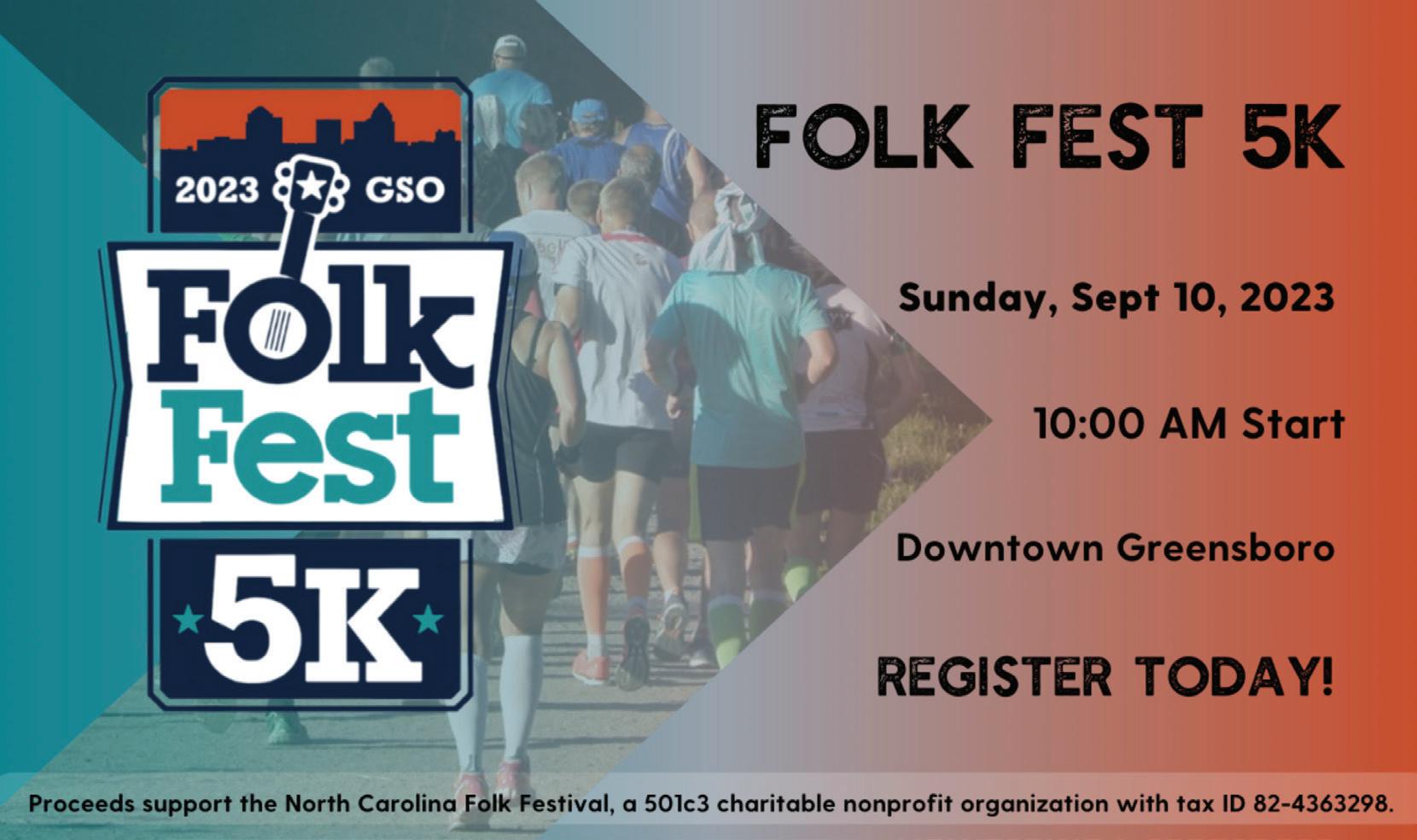
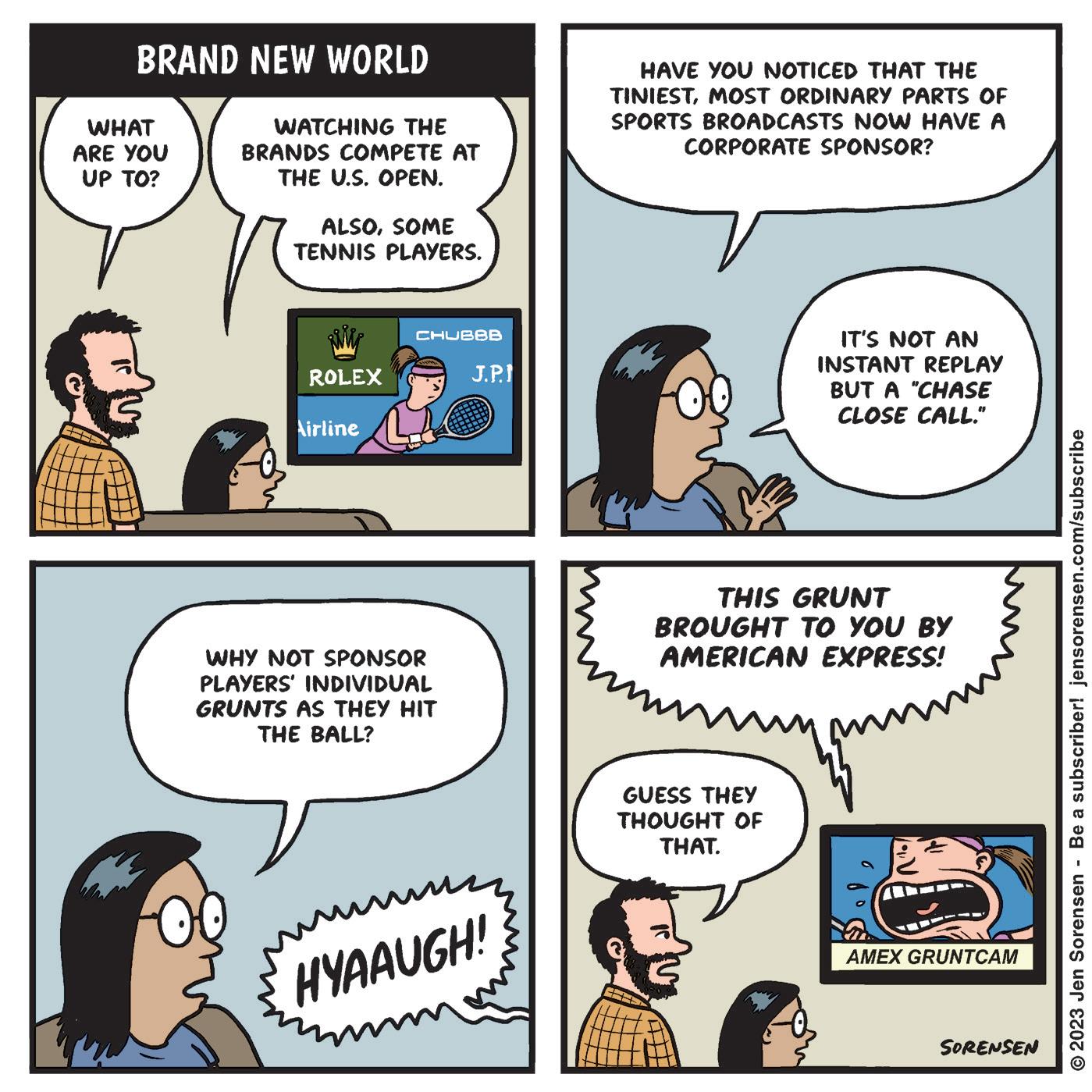
It’s already September,


cast.
It’s just a simple matter of changing state law to accommodate this first NC casino on non-native lands. And that’s no big deal — Sen. Berger can knock that out in one emergency session.
by Brian Clarey
and while the North Carolina General Assembly has yet to pass a budget and fully enact Medicaid expansion, they did legalize sports betting, which is something, I guess.
The new law allows for wagering on most sports — pro and college, including women’s sports, and also horse racing. Apparently we’re getting a new track. This will probably be good for the state. Many of us are already wagering on college basketball, at least during March Madness, and judging by the number of people around here who can’t shut up about their fantasy football teams, there’s plenty of that going on as well.
And then there’s the new casino, fast-tracked for Rockingham County, which you should remember is the home district for NC Senate President Pro Tem Phil Berger. Never mind that hundreds of Rockingham residents actively do not want a casino nearby. The Rockingham County Commission has already voted — unanimously! — to rezone 192 acres for this proposed facility, and when that happens, seasoned political watchers know that the die is already
We’re not against casinos per se. They come with good and bad: tax revenue, land development, jobs and tourist action on the one hand, locals dumping their rent checks into slot machines on the other.




We don’t buy the argument that casinos bring a “bad element” to a community. The inside of a casino is one of the safest places in the world due to heightened security and cameras everywhere. And as anyone who’s ever been to one knows, the people who go to casinos are pretty mainstream: seniors, couples, small groups of men and women trading a little disposable income for free drinks on the floor.
But we should mark the ease with which these gaming bills have gained traction in the General Assembly, greased by heavy donations femur the casino industry. Their ascension shows everyone just how simple real change can be if even just one or two powerful people want it to happen. Yet it never plays out the same way with legislation that actually does something for the public good. Like Medicare expansion, which Berger and Co. have tied to the budget, and then stonewalled its passage until they get what they want.
Surely the casino is on that list.
We should mark the ease with which these gaming bills have gained traction in the General Assembly.


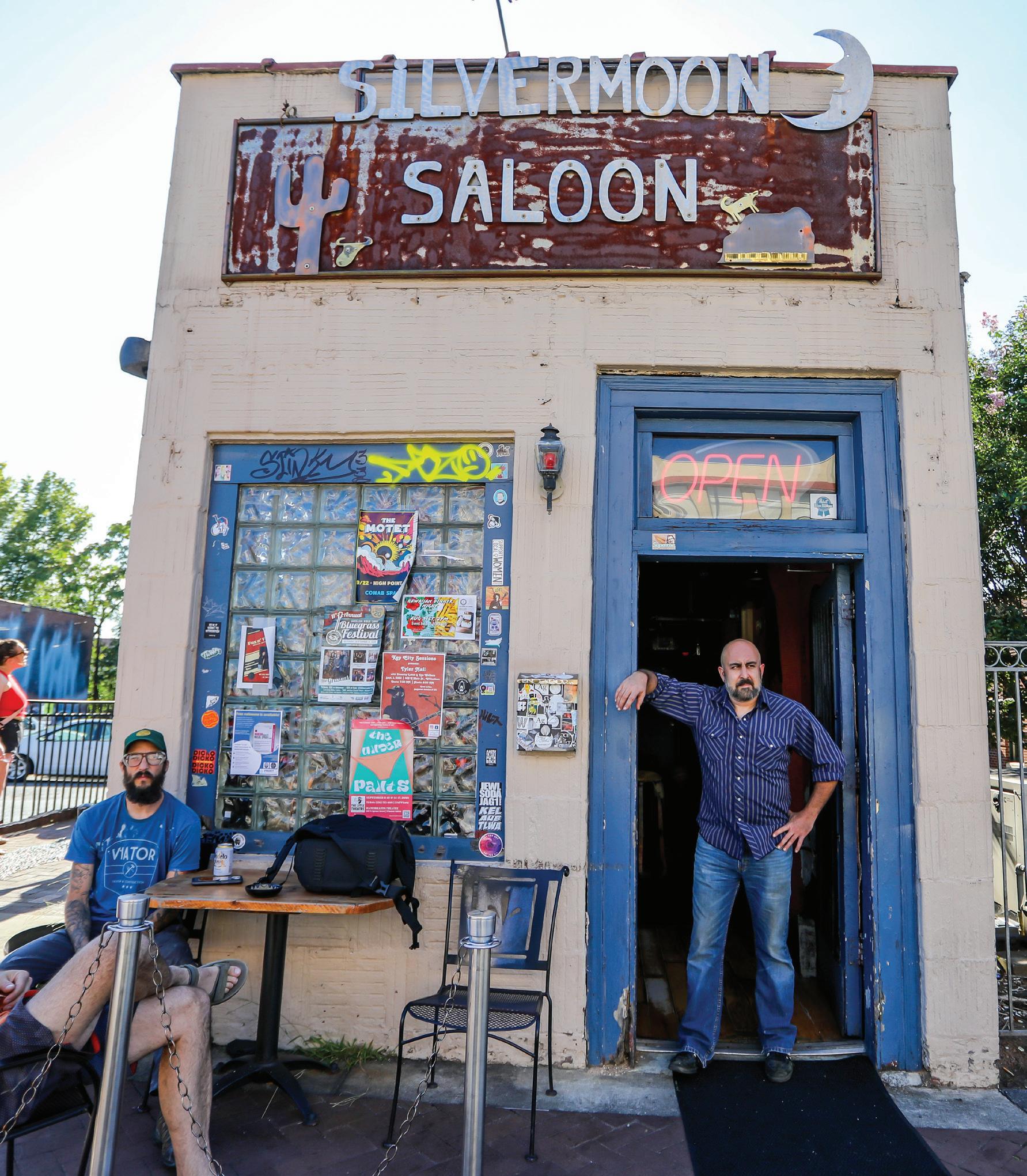 by James Douglas james@triad-city-beat.com
by James Douglas james@triad-city-beat.com
Hello again!
Long time, no see! I know it’s been awhile since we last spoke. I didn’t expect to be away so long and let me just tell you right now; it wasn’t you. You didn’t drive me away. This year has been a whirlwind of events that frankly, made me question my place in the universe. Okay, just a particular street but, in the course of my life, it’s been a pretty important one. I’ve decided to stay for a bit, kick my feet up and see where this goes because, friends and neighbors, I’ve done the one thing that most accountants tell you not to do: I purchased my job. I literally bought my job from my former employers so that we wouldn’t lose ours. And now, Silver Moon Saloon, this dirty little beloved bar that has served cheap beer and heavy shots for the past 20 years is now under new ownership, which is me. And I’m absolutely petrified.
I did have help. Despite the shiny bald head, I’m not some rich, orphanage-bulldozing Daddy Warbucks (I honestly don’t know shit about Annie, but I assume that’s the plot.) I am lucky enough to have found passive investors who care for the uniqueness of the bar, the forward direction of the Arts District, the value of preserving small business ownership and who trusted me enough to not screw them in the long run. To you lovely few people, I say, “Thanks.” It couldn’t have been done without them, because I could never come close to the scratch required on my own. Word of advice here: when starting a new venture, you had best trust those you borrow money from. I was lucky enough to learn by example, but there are a myriad of friendly faces who are happy to give you a personal loan. Plenty of people came out of the woodwork to offer support, once word got out. Some wanted to be partners. Some wanted just to be able to say they were partners without the work involved. Others, well, they wanted enough leverage to put a lien on your house after the high-interest loan they so graciously offered goes bust. These people are called loansharks; avoid them like the plague. They are well-known, popular community members, and don’t come across as predatory. They might not break your knee caps, but they will sue you quicker than you can make the deposit. In a place where, for all intents and purposes, properties are literally being collected by a series of rent-hiking, concept-stealing Daniel Plainview-like speculators hunched over a map of downtown Winston-Salem asking realtors “This… why don’t I own THIS?,” a small dive bar doesn’t seem like much. But there’s a principle, an ethos, that’s wrapped up in preserving it all. I arrived on Trade Street in 2008 after years in the service industry, in one form or another. I had started as a dishwasher at Noble’s Grille when I was 16, and had worked since then as a bartender, a line cook, a server, the whole gamut. I stopped into Finnigan’s Wake after being given an ultimatum by a mediocre management company suck-up at a sub-par chain called “Tripps” to pay for a dine-and-dasher that ran out on a $50 tab. I politely declined. Finnigan’s owner, Opie, was an old friend from the Noble’s days and he had just fired multiple people. I was hired that day as a server. And I saw something that had eluded me for so long at the
other, impersonal places. Community. Characters. Small-Business Ownership.
This was a place where there was a camaraderie between neighbors. Much like a neighbor coming by to borrow a cup of sugar, we traded in citrus and soda syrups. We’d eat and drink at our neighbors’ places when not working at our own. We made solid money, and that brings me to The Customer. No longer would we have an endless parade of scowls on unfamiliar faces who treated servers like the help. We had repeat customers, some daily, who you’d enjoy sharing a drink with after work. There were community events, music, shows and plays all within walking distance. This was Trade Street, and I wanted to be a part of it.
15 years later, I’m next door to where I started. I worked as a bartender when Finnigan’s was Ground Zero for Wake Forest students who held up a constant threat of calling “my faatheeerrr” when kicked out for the fourth time. I worked fine dining and caterings on the side, I was the GM of the Crab Shack on 4th, where I learned about long hours on salary and absentee ownership. I opened a late-night hot dog stand after that and once again was haunted by drunk college students who
I’ve done the one thing that most accountants tell you not to do: I purchased my job.
treated everyone like their caddy.
I was hired at the Silver Moon Saloon and Hoots Brewery in 2015.
I’d still see the same faces from my first days on Trade Street and met so many more. It felt right. No food meant less pushy customers, and only alcohol meant you could say “No” to the ones who did wander in from time to time. As the years progressed, I always offered to my employers at Moon to keep me in mind if they ever wanted to get out of the business. And so, two years after the pandemic destroyed so many lives and livelihoods, we were still standing. But the bosses had had enough. So I made a proposal (a couple actually.) And they took it.
There is freedom in the messy chaos that we deal with daily, and not everyone is suited for it. A dive bar is even more loose when it comes to service. Cheap drinks, not a lot of variety, not very imaginative when it comes to cocktail making. But you can turn and burn like no one else on a busy night.
There’s no juke so the customer can’t ruin nights by playing Phish.
Honesty plays a huge part in being a bartender and telling a customer that they’ve had enough for the night, or shouldn’t be creepy with strangers is met with minimal pushback. We’re the ones your therapists confess to.
The faces, by and large, are familiar ones, so you get to know and care for your regulars like family as the days pass. You gain friends, and you lose them to petty arguments, drugs or death. You see their kids grow and eventually become customers themselves. You go to cookouts, weddings and funerals. You help someone move a couch. You find love.
The main reason, though, is that frankly… I don’t want to start over. No more looking the other way for low pay, no benefits, no more flat-out uncertainty. When you own a place, it’s not just you. Multiple people rely on those jobs and your livelihood isn’t the only one that matters. I’m still terrified by a plethora of “what-ifs.” The uncertainty of doing something you love combined with the opportunity to make it yours is one of those rare gifts few are afforded.
But I’m not an owner, I’m a custodian. Wish us luck.

ne in four American cowboys was Black.
That’s according to reporting by Smithsonian magazine, but due to the patterns of historical racism, much of the narratives and experiences of those who ranched and rode rodeos have been lost to time.
But in one corner of the ninth floor at the Liberty Plaza building in downtown Winston-Salem, photographer C. Stephen Hurst works to resurrect that buried history in black and white.
A young man sits atop a horse in the middle of a body of water while the slight edges of a building, maybe a house, frame the right side. In the background, geometric cellphone towers ground the shot in the modern era. Is the land flooded? Whose land? Why is it flooded? Or has the duo ventured voluntarily into the body of water?

It’s a shot that’s instantly American — the hat, the boots, the patterned blanket under the saddle, the lush deciduous trees in the background — and yet, as part of the new show Alternative Americana, it’s a piece that exists on the periphery of the American psyche.
“It’s art that I consider to be indicative of the American experience but also an outsider on the fringes of that experience,” says curator Zach McCraw as he walks through the space.
Alternative Americana, which opened in mid August, is the newest show in Culture’s 14,000 square-foot space, the entirety of the ninth floor, where the organization hosts exhibits and rents out studio space to about 20 artists.
McCraw has been a part of Winston-Salem’s art scene for more than two decades.
Originally, he was part of the underground culture which had roots in a space called PS211, now known as Krankies. In the late nineties and early 2000s, McCraw had a studio there where he and other artists spent their time hanging out, making art and playing music. A few years later, McCraw moved out west to Colorado and found other DIY, punk art spaces which were notably young, eclectic, active and artsy — the kind of place that PS211 and eventually, the Werehouse,
became known for. By the time McCraw returned to WinstonSalem around 2010, the old PS211 space had become known as Krankies, and a few years afterwards, the building was remodeled into the coffee shop many are familiar with today. But McCraw longed for that kind of collective arts space that he had come to associate with Winston-Salem and the communities he encountered during his time out west.
Between 2014-21, McCraw lamented the fact that the city had seemed to lose a bit of its punk-art charm, although some like Haydee Thompson, who took the Werehouse and created the West Salem Art Hotel, were continuing the tradition.
“It felt like to me… for that stretch of a few years the art scene in Winston-Salem kind of dwindled in a few ways,” McCraw says.
So in 2022, McCraw set his sights on a new space to try to revive some of the past. Walking around downtown Winston-Salem, those who pass the Liberty Building might notice Thai Harmony, which sits on the first floor, but few would think that McCraw’s vision of an underground art space existed within its shiny, corporate-looking walls. For starters, it’s high up, nine stories above ground. Even McCraw understands how different the physical space is compared to past projects of which he’s been a part.
“It’s definitely like an odd concept,” he says. “I think we’re still finding our footing. I definitely would have never guessed it beforehand but in talking with the building manager, I was looking at the space, and looking at the ninth floor that we are on, and the floor is set up with each individual office space, which makes sense that they could be individual art spaces.”
In June 2022, the first artists began to move in. Now, Culture rents out space to about 20 artists out of its 30 studios. The organization was even awarded the 2023
This shot by C. Stephen Hurst of a Black cowboy is on display as part of Culture’s Alternative Americana exhibit right now.Community and Arts Impact Award by the Winston-Salem Arts Council.
And while the space might look different, McCraw says the kind of art that people are making and the shows they’re putting on speak to the countercultural tradition of eclectic art in Winston-Salem.
Around the corner from the elevators, a reaper looks out past the viewer, his shining, silvery cloak cascading down his back. His small hand peeks out of his sleeve to reveal its grip on a large scythe, the blade perfectly crescent, framing his gaunt profile.
“Reaper,” was made by Jerry Wayne Ellis sometime in the 1970s during his time in prison.
It’s rendered beautifully on glass using foil and acrylic. Despite being two-dimensional, Ellis’ careful use of the two media creates aspects of the piece that appear to float towards the reader, like a painting in relief.
“So it’s foil, but it’s also layered,” explains McCraw. “What he did was take paint and pour it over glass, and he let that harden so it was kind of floppy. And he cut it out like stencils, so all of this pieced together. And somebody was telling me that’s the way, back in the ’70s, they did decals on motorcycles, because he was a biker. So this is like an old-school biker technique.”
Nearby, another piece by Ellis hangs on the wall. A larger piece that McCraw has labeled “Bros,” in which a bundle of five skulls and crossbones marked with lightning bolts float in the center of a black background in front of a winged Harley Davidson logo.
Once inside the exhibit, McCraw points out pieces by local artists like photographer Owens Daniels and CK Thompson. Kevin Miller’s sculptures of wood and rolled paper sit on pedestals draped in the American flag. The heads Miller has created act as vases for elaborate dreads that pour out of the temple or a wavy afro that reaches out towards the sky.
Nearby, a video piece of TikTok compilations with political commentary plays on repeat. In the corners of the ceilings, little, black security cameras point down at visitors.
“It’s a commentary on surveillance,” McCraw says about his contribution. “They give you a strange, uneasy feeling in some type of way. Security cameras are supposed to make you feel secure, but the only security that you get is the person who is watching the cameras.”

A few yards away, a piece McCraw found at a Goodwill hangs on the wall. Titled by McCraw as “Punks,” two figures clad in yellow, orange and red dance against a rust background as black music notes float around their bodies. A signature in the bottom right corner denotes that the painting was probably made in 1988 by one Juan Juarez.
It’s obvious, given its unknown provenance and origin, that it’s not the kind of piece you’d see in SECCA or Reynolda House, the city’s established arts venues. But at Culture, it’s exactly the kind of thing McCraw is hoping to highlight.
“We’re not outside funded by any organization,” he says. “We have the freedom to do whatever we want to do.”
Part of curating that kind of counterculture community is hosting regular events for artists and the public. So far, they’ve been hosting monthly meetups and collage nights. In the future McCraw hopes to have spoken-word poetry workshops. It’s based on the notion that the space doesn’t have to be any one thing; it’s changing and growing based on the needs and wants of the community.
“Back in the day, those spaces and that time, which is now 15 plus years ago, it felt very no rules, no direction,” McCraw says. “It was just getting together and making things happen. I still like to retain just the sense of being a very free and open expressive, vibrant, relevant space.”
In addition to spaces like Culture, McCraw points to initiatives like the DOSE Artist Collective that are taking up the same mission of championing underground art.

“The Arts Council has really invested more time into young artists,” he says. “They’re doing a lot of really exciting things.”
As for the future of Culture, McCraw hopes that more artists fill the floor and rent out studios to get back to that collective art-making community like that of PS211 and the Werehouse.
“It feels like an old DIY arts space,” he says. “I’m trying to make it feel like an authentic space where artists can come and feel at home and feel like they have a space that’s their own as well.”
How do you advocate for a community of which you are not a part?
How can you uplift identities that are not yours? How can you be an accomplice rather than just an ally?
These are the types of questions that have been circling artist and curator Jordan T. Robinson’s (he/they) mind for the last five years. His newest show, Transparency, which just opened at the Center for Visual Artists in downtown Greensboro, focuses on the lived experiences of transgender people, an identity that’s not his own.
“When I first started this project, I was like, ‘I want to do this to serve this community, how do I get in touch with them?,’” Robinson recalls. “So I looked up all the LGBTQ centers in the state of North Carolina or any organization that was connected to the LGBTQ community and if I found anything specifically for transgender and genderexpansive people, then I would go for that and reach out to them.”
When Robinson first conceptualized the idea behind Transparency in 2017, it was because he noticed the increasing attacks on trans people across the country.
HB2 had just been passed in NC by former Gov. Pat McCrory, a discriminatory law that barred trans people from using the bathroom that matched their gender. At the same time, political pundit Ben Shapiro had started spreading anti-LGBTQ+ and anti-trans rhetoric at college and university campuses across the country. Then, in July 2017, former President Trump tweeted that trans people would no longer be able to serve in the military.
It felt important for Robinson to do something. And as an art historian and curator of visual art, he believed the best way to do so was to create a statewide art exhibit that highlighted the works of trans artists.
“I’m going to support groups and really asking genuine questions for understanding, and then just being quiet and listening to them tell their narrative, tell you who they are in their own voice, and how you can help them,” he says. “That was very helpful and from my perspective, I think a major part of this project.”
Now, almost three years later, Robinson celebrated the opening of Transparency at the Center for Visual Artists’ gallery space last week. The goal for him was always to have the project inhabit a physical space. There are 19 artists in the show, most of them identifying as trans or gender expansive.
As soon as visitors walk through the doors, they’re met with a work by artist William Plummer (they/them) whose cyanotypes are created using film and fabric. Printed in shades of blue and white, the word “THEM” floats in the center of an apparent speech bubble.
Transparency will be on view at the Center for Visual Artists’ gallery through September. It will then reopen at the African-American Atelier next door on Nov. 3 and run through Jan. 1, 2024. There will be an artist talk on Sept. 13 and a curator tour on Sept. 27. Visit mycvagreensboro. org or jtrpresents.art for more information.
After pitching the idea to trans-led organizations in Charlotte who greenlit the notion, Robinson partnered with Lara Americo (she/ they), a trans, Indigenous, Latina artist who helped Robinson put on the first iteration of Transparency in 2020 virtually via the Guilford Green Foundation.
“She has shown me the ways that I can advocate and be an accomplice,” Robinson says about Americo’s mentorship. “[P]art of that journey has been learning to advocate and spiritually, another personal reason for doing this project is there’s a teaching in my faith about loving your neighbor as yourself. And I personally reflect on that and wonder, What does it look like to love your neighbor as yourself if you don’t know them, and have not made efforts to know them until now? And what do you do from there?”
Since then, Robinson says he’s been asking questions and being silent to allow trans people to fill the spaces.
“Let’s set the tone here first,” Robinson explains about putting the work at the start of the show. “It’s a matter of respect and you need to approach this exhibition with that.”
The idea was to ground visitors in the shared experience of being human from the beginning. He says that through his conversations with trans people through the years, many lament the fact that cisgender people tend to focus unnecessarily on trans people’s bodies, objectifying them.
“There seems to be such a focus on the body before anyone focused on the humanity of this community,” Robinson says. With that understanding, he says the show is made up of three sections that flow into each other. The first focuses on the abstract, the universal.
The bright, saturated digital illustrations by Charlotte-based trans artist Lena Gray (she/they) hang across from small, abstract pieces by CVA Art + Community Coordinator and ally Devon McKnight (they/them). Nearby, photographs by trans artist Melvy Shaw (she/her) capture the delicacy of butterflies perched on flowers, a symbolic mascot for those who choose to metamorphose into their truest selves throughout their lives.
On a pedestal, another form of symbolism hangs on a mannequin in rainbow colors. Made by Sara Westermark (she/her), hundreds of individually tied pieces of tile create the illusion of a tropical bird or a rainbow fish, a small suit of armor for Westermark’s nonbinary child. It’s titled “Armor of Inclusivity.”
The show’s second section, in the belly of the gallery, amplifies the narratives and stories of artists’ lived experiences. Here, artist Huan LaPlante’s (they/them) works
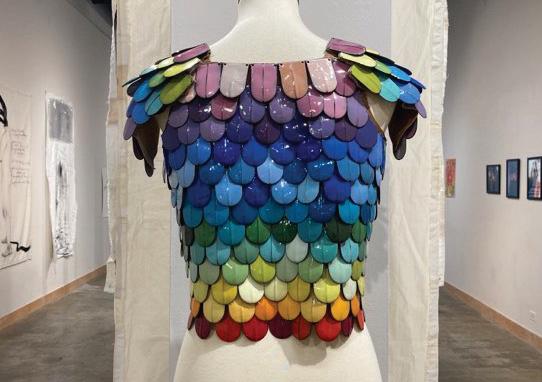 Artist Sara Westermark (she/her) created this rainbow armor for her nonbinary child.
Artist Sara Westermark (she/her) created this rainbow armor for her nonbinary child.
dig into reflections of trauma and harm on broad sheets of hanging fabric in which androgynous figures touch hands while snaking black tubes connect their headless torsos. In the empty spaces of the fabric, LaPlante offers viewers a prompt: exchange the feeling of being one another better to see that ‘you’ and ‘I’ are only fragments of language no real border between perhaps the histories are different but the gravity of the past weighs on us all the same
On the adjacent wall, artist Richard Alvarez (he/him) memorializes iconic Black women important to the LGBTQ+ community like Marsha P. Johnson in neon colors and halos of gold glitter.
In the third section artists explore their relationship to their bodies and their sexuality. They ask questions about who is watching and the difference between objectivity versus space-making.
Artist rakiya (she/her) paints a figure with a UFO in place of their head being ogled at by lustrous aliens, one of whom reaches for the figure’s left nipple. Curtis Walker’s portraits zoom in on the body parts of varying people, showcasing a range of skin types, sizes and shapes. It’s a statement on sharing without shame, focusing without fixation.
And that’s the exact goal of Robinson’s of the project and exhibit as a whole.

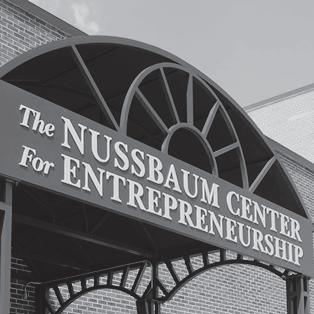
“The best advice I ever heard was, ‘think of this like you’re throwing a party for someone, but the spotlight is on them, you’re just facilitating the space,’” Robinson

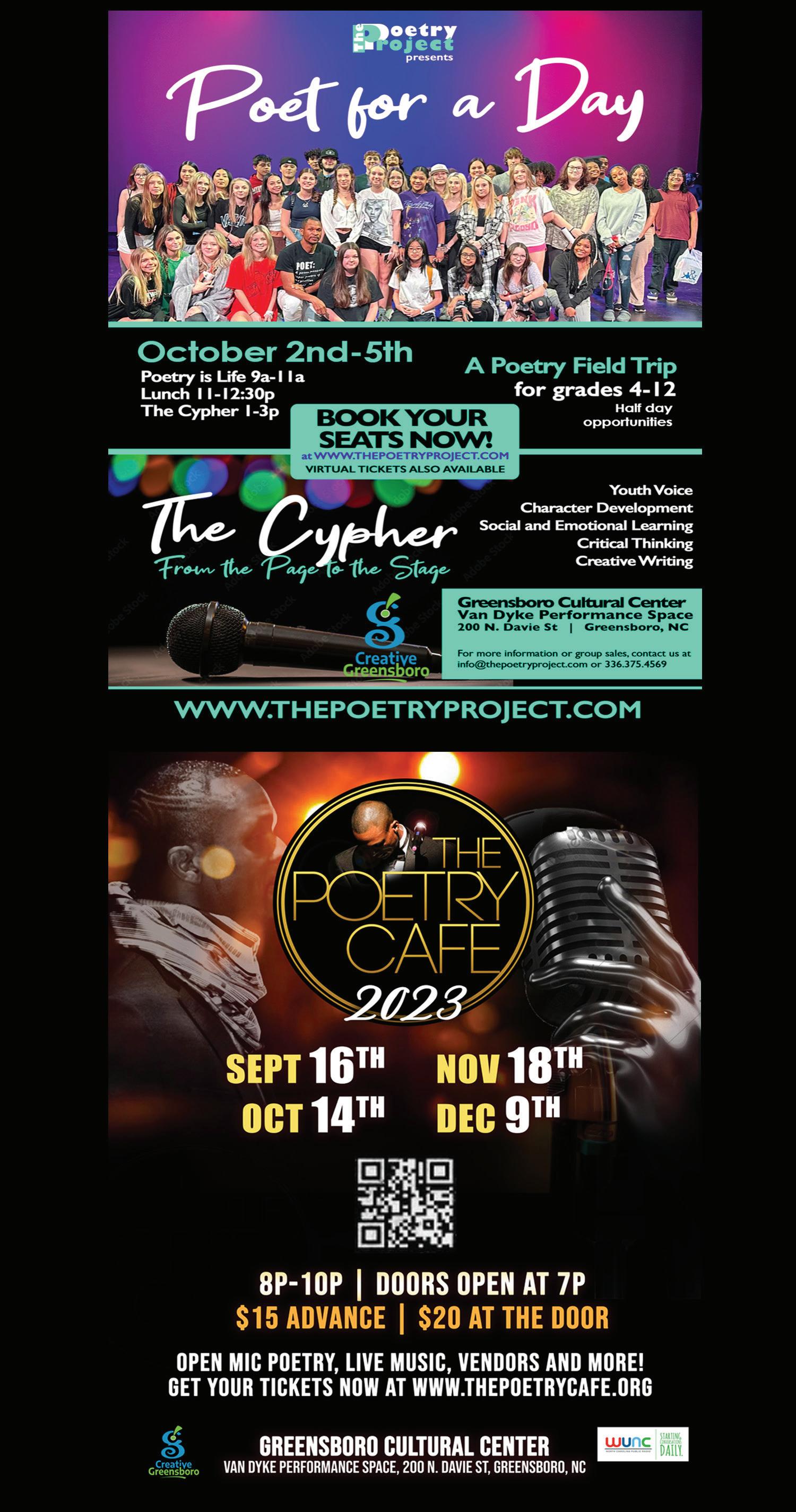

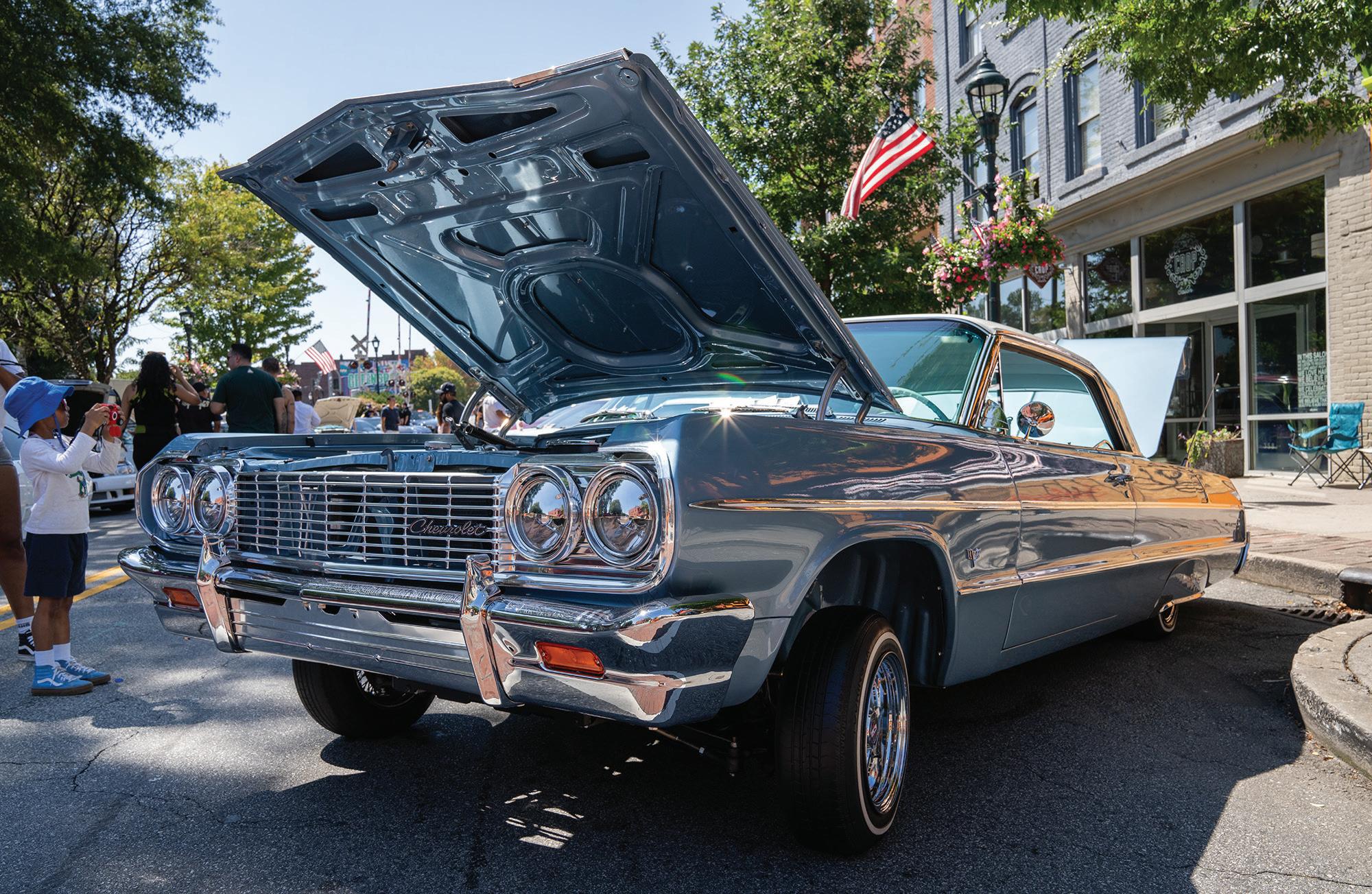 BY CAROLYN DE BERRY
BY CAROLYN DE BERRY
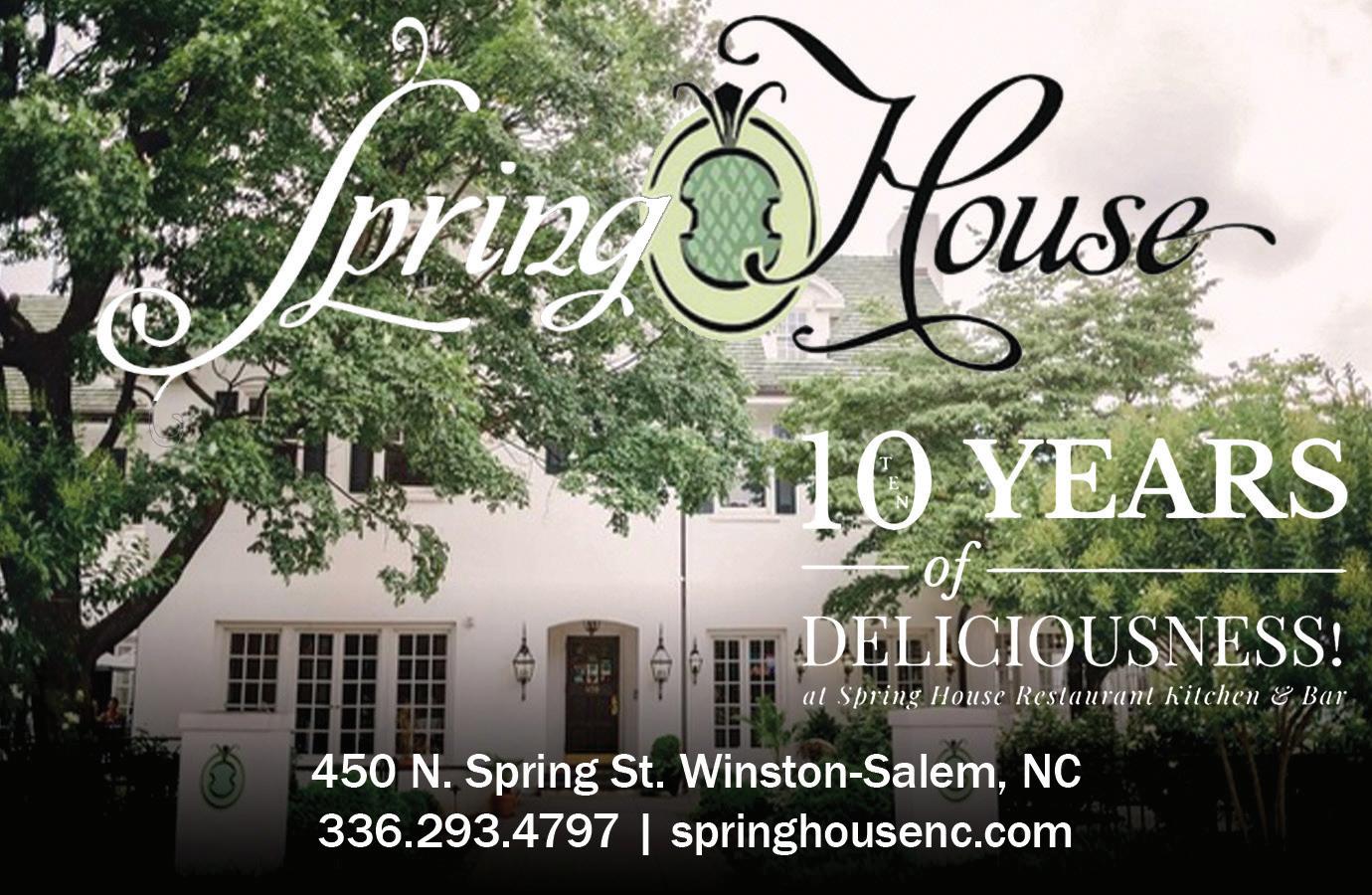 Sunday morning car show.
Sunday morning car show.


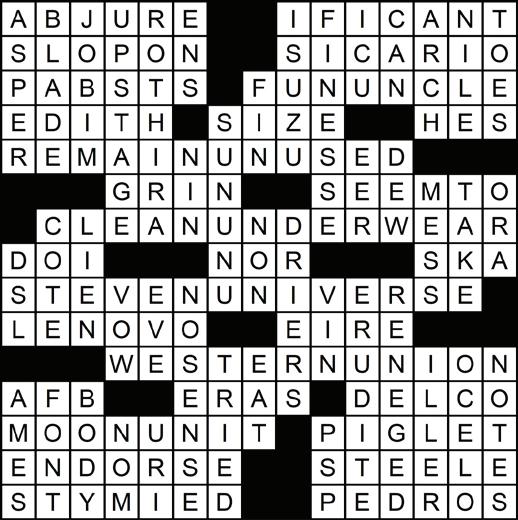

© 2022 Jonesin’ Crosswords (editor@jonesincrosswords.com)
1. “Highway to Hell” group
5. Palindromic formality
10. Fisherman’s bucketful
14. “I’ve got it! I’ve got it!”
15. Landmark that thanked Pee-wee Herman in a July 2023 remembrance
16. ___ dixit (unproven assertion)
17. Singer Del Rey
18. Charged
19. “___ Turismo” (2023 movie)
20. Making waves, so to speak?
23. Radiohead lead singer Yorke
24. Vulgarity
25. Illustrations for “Capt. Storm” or “Corto
Maltese,” e.g.
30. “___ y Plata” (Montana motto)
31. Subtle glow
32. “Fields of Gold” singer
36. Hot rocks?
38. French fountain pen
40. “Peter Pan” henchman
41. Focused
43. Former “Wheel of Fortune” host Bob
44. Singer Janis
45. Alabama fishing village (Bubba’s hometown from “Forrest Gump”)
49. Beethoven symphony originally dedicated to Napoleon
52. Buckwheat noodles
53. December 1773 harborside taxation protest
58. Swordfight reminder
59. Pirates Hall-of-Famer Ralph
60. “Paris, Je T’___” (2006 film)
62. Clothing designer Marc (not the cookware company)
63. Toughen gradually
64. Faux
65. Tandoor-baked bread
66. “Platoon” and “Finding Dory” actor Willem
67. Bit of a hang-up
1. “You’ve got mail!” brand
2. Partially burn
3. Sign on a lawn chair before a parade, maybe
4. Joanie’s boyfriend, in ‘70s TV
5. Xylophone-like instruments
6. Composer Menken
7. “Well, shoot!”
8. Part of a Latin conjugation
9. Flying foe of Godzilla
10. What Sir Mix-a-Lot famously likes (he cannot lie)
11. Kitchen wear
12. Oscar with other awards
13. Like J, sequentially
21. Catholic fraternal org. based in New Haven (not Ohio)
22. Disneyland souvenir
25. Fountain drink
26. Like some history
27. Expenditures
28. “It’s down to either me ___”
29. Clark Kent, on Krypton
33. Faux
34. Almost
35. “Match Game” host Rayburn
37. Radio ratings service (and competitor of Nielsen, until Nielsen bought them out)
39. Carousing
42. Early Doritos flavor
46. Pulled hard
47. Big snake
48. Author and former Georgia State Representative Stacey
49. “The Beverly Hillbillies” star Buddy
50. Comedian and journalist Mo
51. Kobe neighbor
54. Fey of “Only Murders in the Building”
55. “when the rainbow is ___” (last half of a long Ntozake Shange play title)
56. Prefix in rocket science
57. Song spelled with arm motions
61. Heart chart done in the ER, for short
LAST ISSUE’S ANSWERS:
‘Floating Point’ — seas the day.© 2023 Matt Jones
Join Triad Local First on Sunday, October 8th for Blue Jeans, Bourbon, and the Blues!
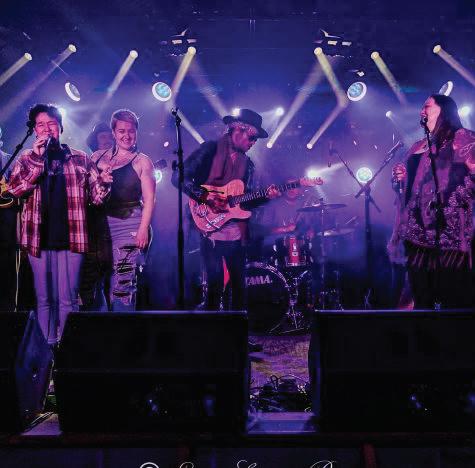
Sunday, October 8th from 4:30pm to 9:30pm at The Gardens at Gray Gables
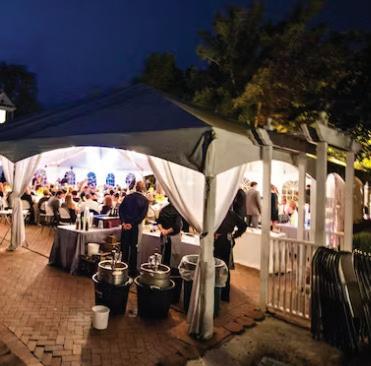
Dancing | Food | Silent Auction
Cigars | Bourbon Tastings
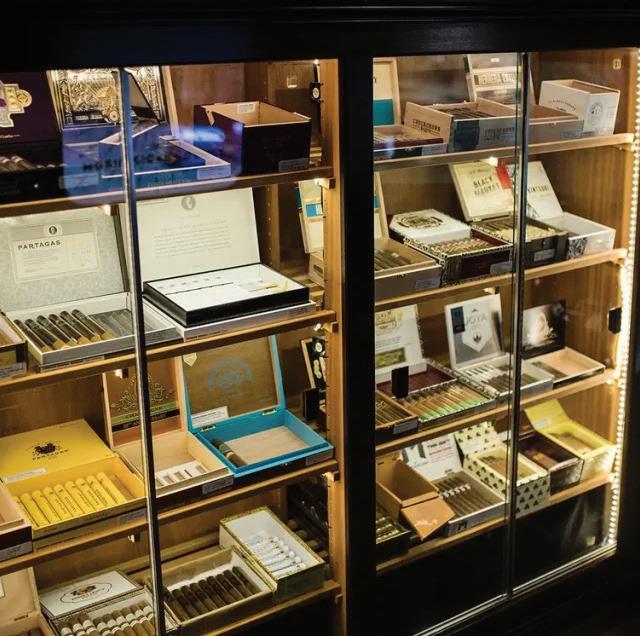
Music by Mama and the Ruckus, Chef is Brian Dicey of Starmount Country Club, Cigars by Silver Smoke
Join us as we celebrate local chefs, farmers, breweries, wineries, distilleries and all things food and drink! In addition to partaking in some delicious, seasonal, fresh, local foods and beverages you will be supporting those in the Triad food-beverage industry.
Tickets on sale now at triadlocalfirst.org